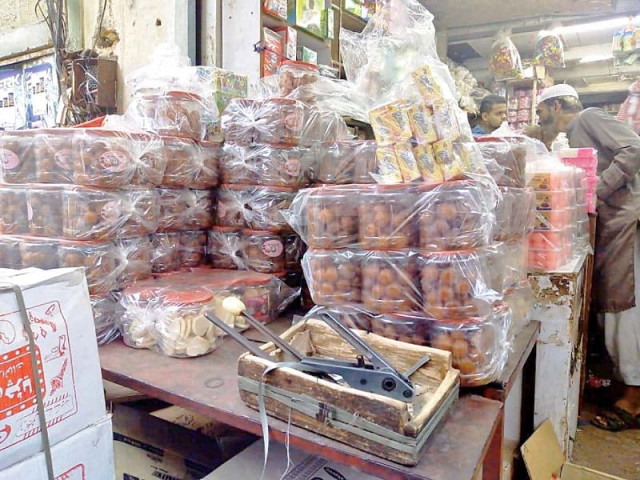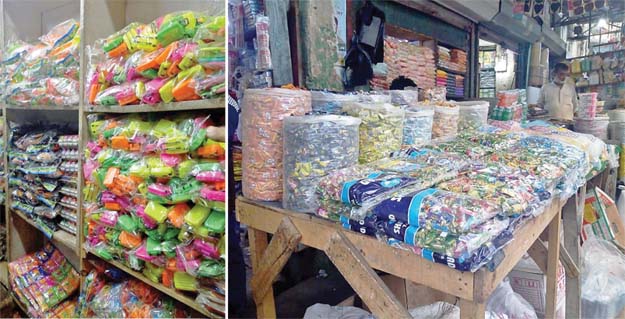Candy crush: local confectionery market under pressure
Uncertain economic conditions adversely affect small-scale confectionary businesses, forcing over half to close shop

In the wake of rising cost of raw material and decreased disposable income of consumers, the confectionary industry is adversely affected. PHOTOS: EXPRESS
Increased gas prices, weakening purchasing power and the depreciating rupee have all contributed to the shrinking of confectionery businesses. The conditions are such that basic confectionery items such as chocolates, candies and nimcos (savoury snacks) among others are getting beyond the purchasing power of the common man.
The abundance of products imported from China and Iran has added to the miseries of the local confectionery industry. The imported items have decreased the production and sale of local items by as much as 60% in recent years.
K-P realistic developmental budget unveiled
Consequently, over half of the smaller establishments have closed shop since 2017 due to internal and external factors. It has also resulted in unemployment of the workforce associated with the businesses.
The primary wholesale market for confectionery items is the Khajoor Market situated in Lee Market. It is home to around 250 shops that deal in edibles for children. Around 90% of the products in the market are domestically produced items that are sold to thousands of retailers across the city. Products are sold in bulk to larger companies of the confectionery industry through distributors, who rake in millions through commissions. Small-scale home-based factories sell their products through this wholesale market as well.

The Khajoor Market also supplies confectionery items to other cities and towns of Sindh, Balochistan and Punjab. According to the All Pakistan Confectionery Association Chairman Muhammad Javed, increase in business costs - electricity, gas and other utilities coupled with the depreciation of the rupee, has severely affected the industry. He stressed the importance of confectionery items and said, "In addition to taste, sweets and other savoury snacks are used as an alternative source of nutrition for children, as they tend to like them, and are commonly served to guests in homes."
The rising business costs have led to an increase in the prices and decline in sales. Confectionery items made in Pakistan are also exported to countries in South Asia and East Africa including Nepal, Bhutan, Sri Lanka, Maldives, Iran, Afghanistan and UAE.
After the increase in costs, however, exports are also facing troubles. The depreciation of the rupee against the dollar has played a big role in increasing costs of manufacturing and packaging including artificial flavours, chocolate, saccharin and food colours that are imported.
Chinese and Iranian products
The import of Chinese and Iranian products has affected the confectionery industry of Pakistan. Despite poor standards, Chinese confectionery products are in high demand because of high profit margins, wide variety and availability for wholesalers.
The confectionery items are sold in cheap plastic toy containers that instantly grab children's attention.
The market share of Chinese confectionery products is more than 10% of the total market. Besides, Iranian products including chocolates, biscuits, juices, toffees and candies are also traded in large quantities. The Iranian products are gradually taking over the retail and wholesale market space with their better quality products at lower prices.
Economic crisis necessitates tough decision: PM
The traders of Iranian products depend on imports which are currently in limbo due to the tightening Customs laws and depreciating value of the rupee. The products offer a variety of flavours to goodies and are sold in attractive packaging. Wholesale markets in Karachi largely deal in Iranian confectionery items due to the customer response to these products.
Ban in private schools
The government's ban on the sale of poor quality confectioneries in public and private schools has also affected the sale of quality products. Confectionery item producers suggest that the government cannot expect to have European standards imposed all of a sudden.
They said that it would take time for such improvements and implementation of laws should be made easy for businesses with practical steps. Step by step measures will facilitate the traders.
Published in The Express Tribune, October 18th, 2018.



















COMMENTS
Comments are moderated and generally will be posted if they are on-topic and not abusive.
For more information, please see our Comments FAQ